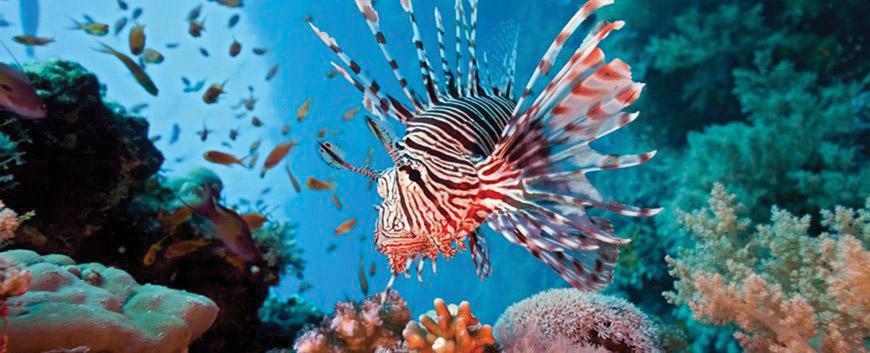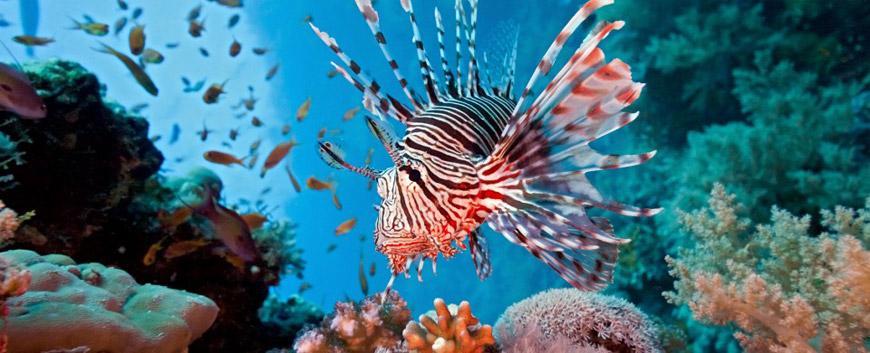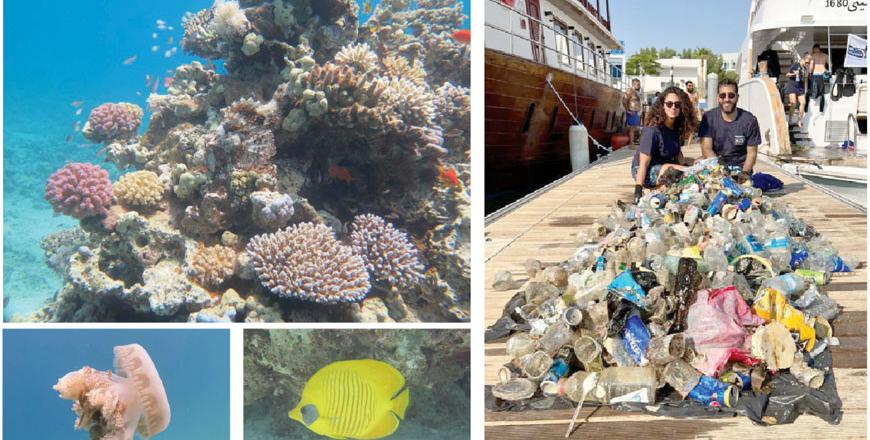You are here
Jordan’s first marine reserve a step closer to being on UNESCO biosphere reserve list
By Sarah Abu Zaid - Dec 19,2020 - Last updated at Dec 20,2020

Jordan’s first marine reserve will play a major role in attracting tourists and diving enthusiasts to Aqaba and preserve its 'unique' coral reefs, according to experts (Photo courtesy of Aqaba Marine Park)
AMMAN — Jordan’s first marine reserve will play a major role in further attracting tourists and diving enthusiasts to the Red Sea city and preserve Aqaba’s “unique” coral reefs, experts and officials told The Jordan Times.
After declaring its first marine reserve mid-December with the aim of protecting marine ecosystems and coral reefs and pushing sustainable development efforts forward, Jordan is gearing up efforts to place the reserve on the UNESCO biosphere reserve list.
The Ministry of Environment had said that establishing the Kingdom’s first marine reserve in the Gulf of Aqaba will contribute to supporting the country’s national economy.
The economic benefit would be materialised through increasing revenues of environmental tourism, creating job opportunities related to the preservation of marine life and practising water sports, the ministry said.
This achievement consolidates Jordan’s fulfilment of international commitments, including the agreement pertaining to protecting biodiversity and marine life, according to the ministry.
The marine reserve was announced in partnership with the Aqaba Special Economic Zone Authority (ASEZA) and the United Nations Development Programme (UNDP), after receiving approval from the Cabinet.
Jordan was among the first countries to join the environmental convention to protect its biodiversity, mainly through establishing nature reserves nationwide.
The cooperation between ASEZA and UNDP will help establish the reserve following the best international practices to create a balance between sustainable consumption of marine resources and their protection. It will also be an addition to Jordan’s network of natural reserves and will help in the protection of biodiversity of the marine environmental ecosystem all over the world.
“This first marine reserve will help preserve marine life in Aqaba and will also help to encourage further diving activities,” ASEZA Chief Commissioner Nayef Bakhit told The Jordan Times.
“Jordan is also working on a management plan for placing the reserve on the UNESCO list, which will be implemented for around one year, then the application will be sent to UNESCO afterwards,” he said.
Abdullah Abu Awali, consultant of the Coastal Management and Protection Unit at ASEZA told The Jordan Times that the new marine reserve will attract tourists due to its “unique and marvellous” diving sites.
“We are seeking to make this marine natural reserve a part of the UNESCO biosphere reserve list and this will be a great achievement for the Kingdom,” he added.
“The requirements will be fulfilled, for the review of UNESCO, by the end of the second quarter of next year,” he said. “We have been trying to preserve this area even before 1997,” he added.
Coral reefs are an essential part of many ecosystems. They are biodiversity reservoirs and significant sources of food and pharmaceuticals.
Over half-a-billion people globally depend on coral reef ecosystems for food, tourism-generated income, and coastal protection, and an estimated 25 per cent of all marine species depend on coral reefs during at least some portion of their life cycles, environmentalists said.
The majority of the world’s coral reefs are predicted to die by the end of this century, if not sooner, but the reefs in the Gulf of Aqaba seem to be resisting the global phenomenon and could potentially be one of the planet’s largest marine refuge sites from climate change, according to experts. However, they are not exactly resistant to bleaching, they are actually more resistant to climate change which causes bleaching, environmentalists said.
Commenting on the opening of the reserve, Nidal Oran, head of Environment, Climate Change & Disaster Risk Reduction at UNDP, said: “The reserve will help protect the corral reefs since it will become one of the main attractions for tourism given the fact that it’s considered very unique and rare.”
The countries that took care of the coral reefs witnessed an increase in tourism rates as opposed to the countries that have not, he added.
“We have to go through some requirements to get accepted in the UNCESO biosphere reserve list and we are supporting Jordan in these efforts,” Oran said.
“With the creation of the marine reserve, there will be a safe centre to preserve the coral reef,” Aiman Soleiman, adviser for environmental affairs at ASEZA told The Jordan Times.
“There will be hotels to welcome scientists and experts and this will play an important role in boosting eco-tourism,” he added.
Soleiman noted that ASEZA will work with the pharmaceutical industry to utilise the medicinal properties of the coral reefs.
“There will be a new aquarium and a sports city which will be full of activities for the tourists,” he added.
Ali Al Sawalmih, director of the Marine Science Station-Aqaba, told The Jordan Times that the new marine reserve will be “a source of attraction” for scientists and experts from all over the world to study marine life and Aqaba’s coral reefs.
“The coral reefs in the Red Sea are very rare because they have the ability to cope with climate changes, unlike any other coral reef in the world,” he said. “Scientists believe that this coral reef is the world’s coral reserve stock,” Sawalmih added.
“Aqaba’s tourists are mainly attracted to unpolluted marine life and its beauty, especially the colourful coral reefs which play a major role in sheltering other marine creatures, forming together a unique and distinguished ecosystem,” he said.
The reserve will be registered with UNESCO to ensure maximum protection from anthropogenic activities, Sawalmih noted.
“The main threat on coral reefs are either the change of surrounding seawater quality — which is usually caused by discharge of effluents into the sea or leakage of chemicals leading to changes in water temperature and salinity — or mechanical damage such as wrong diving habits, wrong anchoring practices, or siltation of litters at sea bottom,” he said.
“The establishment of Aqaba Marine Reserve will protect coral reefs from being impacted by such threats and will provide better preservation policies, as well as culturing more corals to replace the damaged ones, in addition to performing regular underwater clean-up campaigns along the entire Jordanian coast on the Gulf of Aqaba,” he added.
Related Articles
AMMAN — While coral reefs are starting to bleach, turning pale and white in seas around the world, those growing in the Gulf of Aqaba at the
Aqaba reefs face substantial dangers of man-made variety, mainly overfishing, litteringAround 44% of coral species recorded in Red Sea only
AMMAN — The internationally acclaimed Green Fins programme was officially launched in Aqaba on Monday, marking a significant milestone in ma



















